Impact
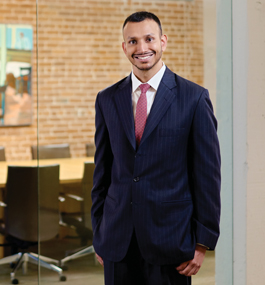
Mohit Gourisaria '09
A Wien Scholar Looks Back, Pays Forward
In 2005, while traveling on an overnight train, Mohit Gourisaria ’09 got a phone call from his mother that changed the trajectory of his life, he says, dividing it into a “before” and an “after.” He’d been accepted to Brandeis, she told him. More than that, the Kolkata, India, native had been selected to receive a Wien International Scholarship, which would give him the financial means to attend.
Along with four sisters, Gourisaria had been born into modest circumstances, and his family put much of their resources toward educating their only son. At age 6, he was sent to an Anglican boarding school in the Himalayas, where he spent the next 10 years.
It was a strict, regimented environment. Students could be caned simply for stepping out of line. Gourisaria’s classmates sometimes bullied him. “It was a pure jungle hierarchy,” he says. “Either you were strong or you were not, and I was not. But I was good at academics, so that became my realm.”
An aptitude test decreed a career in law might be right for him. Gourisaria knew his family was depending on him to make a good living, and America seemed like the place to do that — at least the movies shown at school every Saturday night made it look that way. Now a Wien International Scholarship would pave the way.
The Wien International Scholarship Program provides financial assistance for international students to attend Brandeis. Since its inception 60 years ago, WISP has brought 894 scholars from 115 countries to the university. Former prime minister of Iceland Geir Haarde ’73 is a Wien Scholar. So are former Sony Interactive Entertainment president Olaf Olafsson ’85 and Meher Tatna ’83, Hollywood Foreign Press Association president.
When he arrived at Brandeis, Gourisaria was shy — he had to acclimate himself to college life as well as to a new culture. He discovered a refuge in theater, which became a space for him to find friends and community. He majored in theater arts and economics (“my practical major,” he explains), and minored in business.
Outside the classroom, Gourisaria acted in Brandeis theater productions and even in a professional production of “The History Boys” at the Boston Center for the Arts. He excelled in mock trial, winning a regional competition and a national “best attorney” award. He believed in doing good: After one national mock-trial competition, he went directly to New Orleans to assist with hurricane reconstruction efforts alongside fellow WISP scholars.
Gourisaria graduated summa cum laude from Brandeis and went on to study law at the Columbia University School of Law and the London School of Economics. He was hired by the New York firm Wachtell, Lipton, Rosen & Katz, where Meyer Koplow ’72, P’02, P’05, chair of the Brandeis Board of Trustees, was a partner.
The two had met briefly by chance while Gourisaria was a Brandeis student and now, working at the same firm, quickly formed a bond. “I had never met someone with Mohit’s story,” Koplow recalls. “He exuded quiet enthusiasm in an extraordinary way.”
“Meyer is like a father to me,” says Gourisaria. “If I can be a third of the man that Meyer is when I am his age, I will be a very content person.”
Today, Gourisaria is an associate at Keker, Van Nest & Peters in San Francisco, working as a trial lawyer. “I love the puzzle-solving element that comes with practicing law, where you have to be thinking three steps ahead,” he says.
He and Koplow still catch up by phone every month. And, inspired by Koplow’s devotion to their alma mater, in 2017 Gourisaria joined the Brandeis Alumni Association board of directors.
“We have a mentoring relationship that is as rewarding to me as any I have ever had,” Koplow says. “His thoughtful, brilliant approach to his life, his career and the law never fails to teach me something.”
Gourisaria maintains an active pro bono practice and serves on the board of Turning Green, a Bay Area nonprofit devoted to sustainability. He’s involved with Turning Green’s Conscious Kitchen program, which provides nutritious meals to underserved schools. “In boarding school, I grew up eating pretty bad food,” he says, “so I know firsthand the impact a poor diet can have on your ability to learn.”
He views his service work as a way of paying forward what he has been given. “I have been the recipient of so much generosity from others,” he says. “The Wien Scholarship and Brandeis are the reasons I have the life I have today.
“I often ask myself, how can I be most useful with this education and experience I’ve received — what do I do with this jackpot I’ve hit?”
— Brian Klotz
The WISP 60th anniversary celebration will be held on campus on March 9-10, 2019. For more information, visit alumni.brandeis.edu/wien.

Zamira Korff
Enduring Ties
I recently met with an alumni couple whose time at Brandeis was extraordinary. Speaking with passion, sincerity and gratitude, they said they had found a second home at the university, complete with professors who were like family members — deeply concerned not only with their academic progress but also with their growth as individuals, conveying interest in their well-being outside the classroom, and engaging them in meaningful conversation about the challenges and opportunities ahead. Thirty years after graduation, the memories these alumni shared with me were still vivid and potent in the retelling, because they have often thought about the ways their professors shaped the very direction of their lives.
Although this couple’s story was special to them, there are countless examples of such dedication and engagement on our campus. President Ron Liebowitz’s framework for Brandeis’ future rightly recognizes and emphasizes these experiences. He understands the value — as do I — of the strong connections between faculty and students, both undergraduate and graduate, that this community fosters.
At Brandeis, the tradition of close faculty-student bonds has stretched across seven decades. Faculty welcome students into their classrooms and laboratories, giving them opportunities for intellectual exploration. Academic rigor, the foundation of a Brandeis education, is essential to living a rewarding life in whatever careers and personal pursuits our students choose.
As we look ahead to all that must be done to follow the road map President Liebowitz has set before us, we must place these special connections at the center of our work. We must do all we can to enable future generations of faculty and students to work closely together, often across discipline boundaries. Creating the facilities and providing the resources needed to ensure and expand these collaborations will be a prodigious effort. Fortunately, we have 70 years of enduring student, faculty and alumni relationships to guide and inspire us.
Sincerely,
Zamira Korff
Senior Vice President of Institutional Advancement
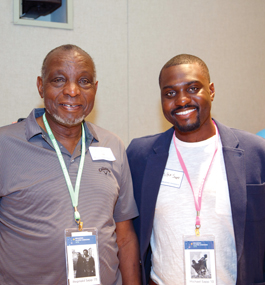
Reggie Sapp '73, MA'05, and Mike Sapp '13
Grandfather and Grandson, Two MKTYP Success Stories
Before he came to Brandeis to be part of the inaugural class of the Myra Kraft Transitional Year Program, Reggie Sapp ’73, MA’05, was already a trailblazer.
Sapp was a member of the first desegregated class of Florida’s Gainesville High School. “We were escorted to school by state troopers,” he says. “Other students would throw pennies and bananas at us, spit at us, stuff like that.” He couldn’t join the band, he was told, because the school couldn’t “protect” him. The object of hatred and discrimination, he didn’t finish high school but later obtained a GED through a summer program at Indiana State University.
Intellectually gifted and naturally curious, Sapp never doubted he would go on to college. Opportunity knocked when Alex Aikens ’71 came to Indiana State on a recruiting mission for a new Brandeis program. And so Reggie enrolled at the university as an MKTYP scholar.
MKTYP was known as the Transitional Year Program until 2013, when it was renamed to honor the late Myra Kraft ’64, H’12. Each year, a competitive application process selects a small cohort of students who demonstrate exceptional academic aptitude but, due to extenuating life circumstances, require a transitional year to acclimate to college-level academics.
Forty years after Reggie Sapp enrolled in MKTYP, his grandson, Mike Sapp ’13, took the same step. Mike’s family had moved around so much that he attended four high schools in as many years. MKTYP allowed him to make up for not having access to Advanced Placement or honors courses.
Both Mike and Reggie describe their MKTYP academic experience as “intense,” praising the academic advising the program provides. Reggie says his cohort of scholars “all had a voracious appetite for learning — the opportunity just wasn’t there before. So once we got it, we took advantage of every moment. We were always burning the midnight oil.”
Reggie’s personal experience with racism fueled his passion for sociology, which he majored in. “I wanted to understand how people can grow up in an environment hating someone that you see and work with every day,” he says. In January 1969, he joined the student sit-in at Ford Hall to demand a more inclusive, equitable and diverse student experience at Brandeis (see a photo of him from that time).
Decades later, Mike also majored in sociology, taking courses with Professor Gordie Fellman, just as his grandfather had. “I went from living in a predominately black community to being the only person of color at my high schools,” Mike says. “The whole experience made me more passionate about understanding how different people think and how they can coexist.”
Mike says MKTYP and Brandeis taught him “the power of putting yourself out there and learning how to be comfortable in uncomfortable situations.” When he got the chance to study in Beijing as an undergraduate, he jumped at it. Since graduating from Brandeis, he has worked as a project management associate at Deloitte and a project coordinator at Sony Pictures Entertainment, among other positions.
Reggie’s career path has included opening a youth halfway house; working with ACTION, a U.S. volunteer agency; and owning a McDonald’s franchise. Today, he and his wife own and operate a farm in Canton, New York. “It’s a lot of work, but it keeps me alive,” Reggie says.
“My grandfather has been a great mentor for so many people, including me,” Mike says. “I’m beyond grateful to share an experience with MKTYP with someone who inspires me so much.”
— Brian Klotz
Picture-Perfect
A photo gallery from events and meetings around the world.
Brandeis Uncorked
Young alumni leaders gathered at Manhattan’s City Vineyard at Pier 26 for an evening of conversation with President Ron Liebowitz to learn more about Brandeis’ strategic priorities, young-alumni engagement and philanthropy.
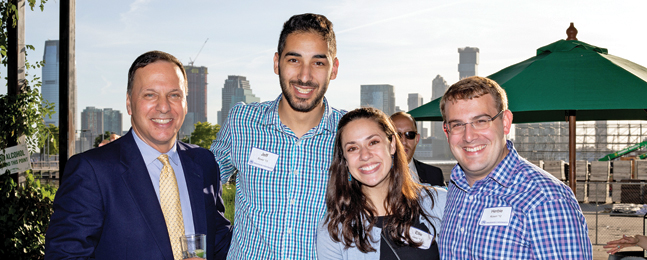
Liebowitz, Jeff Boxer ’13, Elle Getz ’13 and Herbie Rosen ’12.
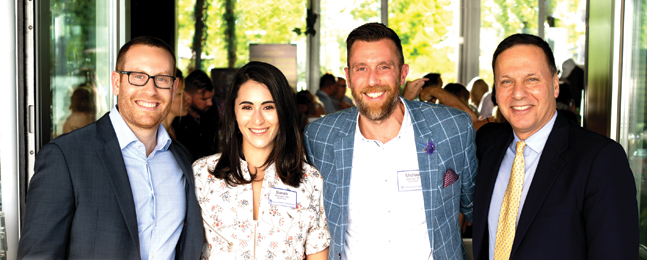
Event hosts Daniel Rueven ’09, Sarah Rueven ’09 and Michael Saivetz ’97 with Liebowitz.
Reception in Jerusalem
In June, more than 80 Brandeis alumni, parents, students and friends had a chance to meet President Ron Liebowitz and his wife, Jessica, at the Inbal Jerusalem Hotel.
Insight Into the Opioid CrisisAndrew Kolodny, co-director of Heller’s Opioid Policy Research Collaborative, was the featured speaker at two events, one in Boston, the other in the Hamptons. Kolodny’s topic was the opioid crisis — its present scope, its history and possible methods for curbing it.
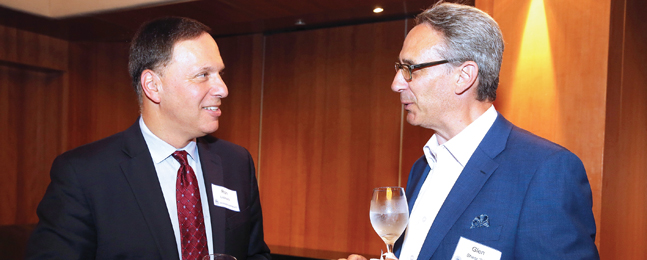
Ron Liebowitz with Glen Shear ’81, past president of the Alumni Club of Israel.
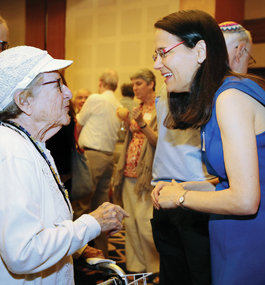
Adaire Klein ’53 talks with Jessica Liebowitz.
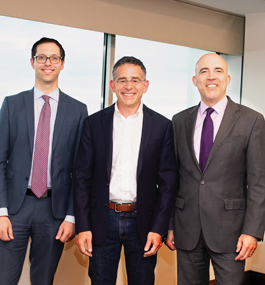
Sixty alumni, parents and friends attended the Boston talk, held in June at the Mintz Levin offices. Pictured: Kolodny (center) with Jonathan Sclarsic ’03, immediate past co-president of the Alumni Club of Greater Boston, and Trustee Bram Shapiro, the event host.
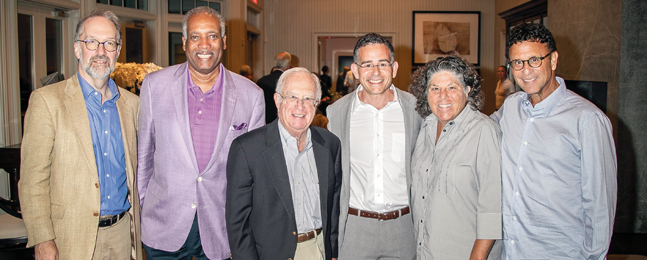
In August, the Hamptons talk attracted 75 alumni, parents and friends. Trustee Mindy Schneider ’75, P’17, and Michael Lesser, P’17, served as hosts. Pictured: David Weil, dean of the Heller School; Trustee Curtis Tearte ’73; Stuart Altman, the Sol C. Chaikin Professor of National Health Policy at Heller; Kolodny; Schneider; and Lesser.
